Are you looking for a whole slide image (WSI) scanner? Whether this is your first time buying one or you’re a seasoned digital pathology expert looking to expand your existing setup – this article can help you with some of the initial research.
We’ve compiled a list of the top 10 digital pathology scanner companies, showcasing a diverse range of high-performance solutions designed to meet the needs of any laboratory. From compact, cost-effective models to advanced, high-capacity scanners, each company brings unique features and innovations that enhance scanning efficiency, image quality, and overall lab productivity. Whether you’re looking for rapid scanning speeds, advanced imaging capabilities, or flexible compatibility with various slide types, the right scanner can make a significant difference in optimizing your workflow.
Here are the top WSI scanner companies in alphabetical order:
1. 3DHISTECH
The 3DHISTECH digital slide scanners are optimized for routine pathology, featuring one-touch, automatic scanning and an optical system tailored for clinical samples. THEIR solutions range from the affordable, entry-level PANNORAMIC Flash DESK DX for basic clinical diagnoses to high-speed scanners like the PANNORAMIC 1000 DX, capable of handling up to 1000 slides. They also sell compact, high-performance models for medium-to-large pathology labs requiring high-quality, rapid scanning. All models utilize a standardized optical system to ensure consistent, high-quality slide reproduction across devices, and each scanner includes a self-calibration feature to maintain peak image quality during continuous daily use.
2. Grundium
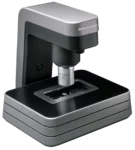
3. Hamamatsu
The NanoZoomer Series from Hamamatsu is a family of advanced, whole slide scanners that rapidly convert glass slides into high-resolution digital images through high-speed scanning, making it ideal for both clinical and research applications. Known for their remarkable image quality, NanoZoomer scanners provide precise and detailed visuals that support accurate analysis and diagnosis. The series offers a range of models with specialized functions, including fluorescence image acquisition and multilayer scanning, accommodating a variety of pathology needs. Their user-friendly functionality, paired with exceptional speed, versatility, and reliability, makes the NanoZoomer Series a great choice for laboratories and research facilities requiring high-performance digital pathology solutions.
4. Huron
Huron offers three advanced scanner models in its TissueScope line, each designed to meet varying scanning needs. The TissueScope™ iQ boasts the highest capacity, scanning up to 400 standard slides or 200 double-wide slides with native real-time indexing for image search, making it ideal for high-volume labs. The TissueScope™ LE and LE120 provide best-in-class scanning, capable of handling any slide size up to 6″ x 8″, with the LE120 offering a higher capacity of 120 slides and continuous scanning for efficiency. Key differentiators across the models include broad compatibility with non-proprietary BigTIFF and DICOM file formats, as well as patented MSIA Technology for improved image quality, resolution, and noise reduction. With fast scanning speeds averaging 60 seconds per slide, these scanners are configurable to meet specific lab requirements and support streamlined workflows through triaging and quality control.
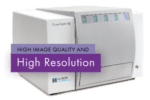
5. Leica
The Leica Biosystems Aperio series of digital slide scanners offers quality, speed, and reliability, making it ideal for both diagnostic and research pathology. The flagship Aperio GT 450 DX model is designed for high-volume clinical settings, with custom optics that deliver high-quality images for on-screen diagnoses. This high-capacity scanner can handle 450 slides at a time with no-touch scanning and continuous loading from the HistoCore SPECTRA Workstation, enhancing both speed and efficiency. The GT 450 DX also includes secure IT infrastructure, allowing labs to manage multiple scanners via a centralized SAM DX server. Compact models like the Aperio CS2 and LV1 offer accessible, high-quality scanning solutions, with the CS2 suited for medium-volume use and the LV1 providing remote live viewing within 15 seconds. The Leica scanner portfolio emphasizes speed, ease of use, and scalable IT solutions, empowering both clinical and research labs to achieve high-quality digital pathology with rapid turnaround times.
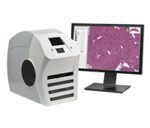
6. Morphle Labs
Morphle Labs offers a range of high-performance, affordable digital pathology slide scanners designed to enhance laboratory workflows across various specialties. Their scanners feature fast scanning capabilities, with models like the MorphoLens 240 providing high-resolution imaging at 40x and 100x oil objectives, enabling efficient whole slide imaging in under 90 seconds. With a robust 0.3% rescan rate, Morphle Labs’ scanners are good for high-volume labs, offering exceptional image quality for histology, IHC, cytology, and more. Morphle scanners are versatile, supporting a wide range of specimen types and slide formats with unique features like live z-stacking and multi-format slide scanning. Additionally, they provide cost-effective solutions with cloud storage options at just 10 cents per slide per year, along with a risk-free, 30-day trial to ensure satisfaction. With its focus on speed, quality, and affordability, Morphle Labs is a leading choice for digital pathology solutions.

7. Motic
The MoticEasyScan series offers an affordable, high-quality path to upgrading lab workflows with industry-leading slide scanners and software. With over 30 years of expertise in optics and microscopy, Motic combines precision manufacturing and reliable hardware to deliver scanners that make creating, sharing, and reviewing slides easy and efficient. Designed for pathologists, MoticEasyScan offers multiple customizable scan modes, including Z-stack for thick samples and High Precision for challenging slides, all while achieving full scans in just 60 to 160 seconds. With powerful objectives from 2X to 40X and a high-NA 20X objective for superior resolution and color fidelity, Motic scanners ensure exceptional image quality. Open file format compatibility (DICOM, SVS, JPG) simplifies integration, and secure, encrypted portals safeguard patient data. Dedicated training, onboarding, and 24/7 onshore support make Motic an outstanding choice for labs ready to embrace digital pathology.
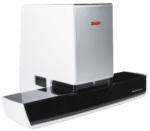
8. Philips
Philips offers a range of advanced digital pathology scanners that transform workflows and enhance patient care. The SG60 is ideal for laboratories with a lean workflow, providing high throughput, high first-time-right rates, and load-and-walk-away scanning, making it perfect for scanning small batches and achieving quick turnaround times. For high-volume labs, the SG300 maximizes scanner utilization and reduces the total cost of ownership through overnight scanning, allowing for efficient and cost-effective digitization of histology samples. Both scanners produce high-quality clinical diagnostic images suitable for routine use and integrated pathology networks.

9. Pramana
Pramana’s digital slide scanners offer innovative, modular systems designed to meet the evolving needs of pathology labs. With seamless scalability, users can effortlessly add scan heads as their capacity requirements grow. Pramana’s autonomous operation handles most slide types with minimal intervention, while inline quality assurance and edge AI enhance imaging accuracy and efficiency. The system’s flexibility includes support for both Pramana and Sakura baskets, enabling optimized workflows. With rapid rescanning, advanced volumetric imaging, and real-time algorithm capabilities, Pramana scanners ensure high-quality, cost-effective digital pathology solutions that elevate both research and clinical practices.
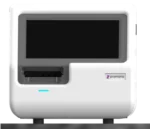
10. Roche
Roche’s VENTANA® digital pathology whole slide scanners provide high-resolution imaging and efficient, scalable solutions for labs. The VENTANA DP 200 is perfect for specific use cases such as frozen sections, urgent cases, and remote scanning, while the VENTANA DP 600 offers high capacity for labs scaling toward full digitization with the ability to scan up to 240 slides at once. Both scanners feature built-in calibration, dynamic focus technology, and minimal rescan rates, ensuring consistent, high-quality images. With a user-friendly interface, tray-based slide movement, and fast, touch-free scanning, VENTANA slide scanners streamline workflows and improve turnaround times, helping labs meet the increasing demands of digital pathology.

Selecting the right digital pathology scanner is a critical decision for any laboratory or pathology practice, and the companies highlighted in this article offer some of the best solutions available today. Each scanner is designed with specific features and capabilities to improve image quality, enhance workflow efficiency, and support the diverse needs of clinical and research labs.
To get the most out of these cutting-edge scanners, however, it’s essential to pair them with a powerful digital slide viewing system. Lumea’s digital-pathology-based LIS BxLink™ and its viewer provide ideal complements to any scanner, ensuring seamless integration and a unified platform for slide management, viewing, analysis, and sharing. Lumea’s all-in-one platform enhances diagnostic efficiency by enabling pathologists to access and review slides on multiple devices, order genetic tests with a button, and consult with peers—all while ensuring smooth data management. By combining the best scanners on the market with Lumea’s versatile software, you can unlock the full potential of your digital pathology system and streamline your entire workflow.
Explore our other tissue technology options to see how else we can level up your digital pathology experience.


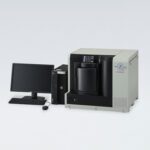

Interesting article but I do not think it addresses the true top scanners. Digital Pathology is about capturing exacting data as fast as possible. The factors of this happening are the product sensor technology and the motion system. Some sensors can capture data while moving and some need to stop to capture data in a small zone both of these approaches have different motion challenges. Either type of sensor relies on the motion system to move in a precise serpentine motion over the cells which 90% of commercially available stage systems can not accomplish at sub-micron precision. These less precise systems need to do multiple scans and average the data which again is not precise only a mathematical estimation plus it adds unnecessary time to the process. Building motion systems for Digital Pathology for more than 15 years has given ALIO a unique vision and experience for data precision and motion performance.